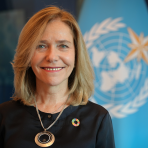Opening remarks on the occasion of the Global EW4All Multistakeholder Forum
Excellencies, Distinguished Delegates, Colleagues, and friends.
It is a great pleasure to welcome you to the first global EW4All Multi-Stakeholder Forum.
Let me begin by expressing WMO’s sincere appreciation to the Government of Switzerland and to His Excellency Ambassador Julien Thöni who has joined us today, for the Swiss’ longstanding support to the WMO and to the broader UN and disaster risk reduction community.
I would also like to add a word of appreciation to my dear friends Kamal Kishore and Selwin Hart. WMO deeply values our close collaboration toward shared goals. This is extensive to our colleagues from ITU and the International Federation of Red Cross and Red Crescent Societies.
Excellencies,
Our thoughts are with the Swiss Alpine village of Blatten, which was flattened by a glacier collapse last week. It is a potent warning about our warming world. But behind the shock is a message of hope: early action avoided human losses. From understanding risk to effective forecasts, communication and evacuation. Early warnings and early action work – they save lives. And that is our top priority.
I’ve just returned from Dushanbe, Tajikistan, where the first International Conference on Glacier Preservation brought together global leaders to address the urgent risks of glacier melt. The focus was clear: raise awareness and define concrete actions from science to decision-making.
A powerful takeaway was the strong political will to strengthen Early Warning Systems (EWS). From the President of Tajikistan to the Prime Minister of Pakistan and ministers worldwide, the message was unified: EWS are essential to protect people and livelihoods.
This momentum reinforces the critical role of multi-stakeholder collaboration in making Early Warnings for All a reality — no single actor can do it alone.
As the UN specialized agency for weather, climate and water, WMO stands at the scientific core of early warning systems. Our work is technical but our purpose is human. The WMO community provides the science to see the storm before it strikes, the tools to track its path and the alerts that sound the alarm. Yet no warning – however early – is effective unless it reaches the right people at the right time. And that is why we are here today. To cement our partnerships and trust which are essential to early action.
I therefore thank our co-organizer, the United Nations Office for Disaster Risk Reduction and all members of the Early Warnings for All Multi-Stakeholder Forum organizing committee. Alone we can do so little, but together we can do so much.
Today marks the first global EW4All Multi-Stakeholder Forum. It reflects the discussions during the regional events over the past year.
All five regional forums concluded that EW4All has made progress. Let me share four examples of success, within the area of WMO’s mandate:
- We have stepped up real-time data sharing through the WMO Information System, with training and support to 90 countries in the last two years.
- As tropical cyclones become more intense, we have worked through WMO’s global network of regional specialized centres to update cyclone forecasting guidance products so countries can benefit from more accurate forecasts and warnings.
- We have updated guidance on heat indicators and plan to increase support on heat advisories through our Regional Specialized Meteorological Centers in India, Singapore, Kenya and South Africa. I would like to give a special mention here to the fact that today is Heat Action Day to highlight what we can do to combat this major killer.
- We have developed technical regulations on early warning services to standardize service delivery.
This builds confidence and trust in NMHSs as the authoritative voice on weather, climate and water. With support from Norwegian Capacity (NORCAP) and the Climate Risk and Early Warning System Initiative, we are supporting the digital transformation of NMHSs. Half the countries in Africa received technology and training. This support increased the warnings published by countries by 2500% compared to the past and added 1000 new stations from Africa to the Global Basic Observing Network. This is concrete. This is happening. This is great news!
Excellencies, friends,
We can be proud of our success. But we must go further. And faster. And together.
That is why we are here: to reaffirm our commitment to collaboration and to action. I mentioned four successes, let me now mention Five key points that should drive our action:
- The science must connect to people.
- The systems must be inclusive.
- The partnerships must be expansive.
- The benefits must be universal.
- We must broaden the tent. This is no longer the domain of meteorologists and disaster managers alone. It is about schools and farmers, mayors and mobile operators, engineers and indigenous leaders. We must open the system to new actors, new technologies, new perspectives, and most importantly, to those who are most at risk.
WMO and our partners are working to strengthen National Meteorological and Hydrological Services and integrating them with risk-informed governance. But governments cannot do this alone. Civil society, youth, the private sector, academia and communities themselves must be co-creators of the solutions.
Let me underscore: Early Warnings for All is not just a UN initiative; it is a global movement, anchored in national ownership, supported by international solidarity. It is driven by a shared imperative: to ensure that no one is left behind when the next storm hits or when the next flood rises.
As we move forward, we must continue doing so together; with science as our guide, partnerships as our strategy, and people and planet as our purpose. Only with this approach will our collective efforts result in a more peaceful, equitable and resilient world.
Thank you!
Statement by


